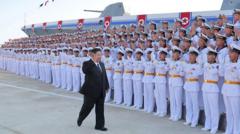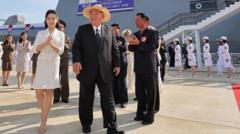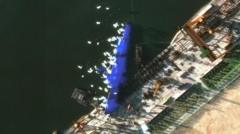The recent incident involving a North Korean warship that capsized during its launch has provoked significant interest and analysis from experts and observers. The incident, which resulted in no casualties and a minor hull damage, has been illuminating in terms of the regime's response and the underlying political implications for Kim Jong Un's governance.
**Analyzing North Korea's Warship Incident and Its Implications for the Regime**

**Analyzing North Korea's Warship Incident and Its Implications for the Regime**
In the wake of a warship capsizing, Kim Jong Un's response underscores a shift in narrative strategy within North Korea, aiming to consolidate power and loyalty.
The ship, one of only two destroyers North Korea has constructed recently, is part of Kim’s ambition to build a potent naval force capable of nuclear strike capabilities, reflecting a determination to reposition North Korea within the global military landscape. Experts suggest that the navy's development is crucial, given its perceived inadequacy compared to maritime powers of South Korea, Japan, and the United States. Choi Il, a retired South Korean navy captain, emphasized that despite the regime's formidable land-based nuclear capabilities, its maritime force remained notably weak.
The timing of Kim's furious public reprimand following the capsizing indicates more than mere anger; it reveals a calculated political maneuver. By publicly denouncing the failure as a “criminal act” and insisting on accountability for those responsible, the regime seeks to frame its leadership as proactive and committed to maintaining the nation’s dignity. Notably, this response represents a departure from the traditionally opaque approach of concealing negative information, as analysts argue that the regime is adjusting to the flow of information within the country.
Not only did Kim's swift order to rectify the ship highlight his control over the narrative but the subsequent praise given to a worker who died during construction exemplifies a strategic effort to foster loyalty among the populace. Experts point out that this shift in narrative effectively places the focus on collective sacrifice and dedication to state goals, invoking a strong ideology tied to the regime’s objectives.
Ms. Lee from the Stimson Centre notes that this method of governance, which includes showcasing difficulties as opportunities to demonstrate responsiveness, is a significant evolution from past practices and affirms Kim’s adaptability as a leader. The rapid relaunch of the warship, accomplished in just over three weeks, further solidifies the regime's messaging that it can overcome adversity and innovate rapidly – ultimately instilling confidence among citizens.
The implications for international observers must not be understated; the regime’s ambition to operate a nuclear-capable navy raises alarms about its ability to exert military capabilities beyond its own territorial waters. The possibility of preemptive nuclear strikes reinforces the need for vigilance and preparation among neighboring countries and international stakeholders.
As the narrative unfolds, experts concur that Kim Jong Un is positioning North Korea more assertively on the global stage, transforming it from a sequestered nation into one projecting power and capability. The recent warship incident exemplifies how even failures can be repurposed into narratives of success and resilience, an essential tactic in amassing loyalty and reinforcing the ideological foundation of the regime.
In conclusion, the North Korean warship incident extends beyond a mere botched launch; it reflects Kim Jong Un's strategic adaptation in governance and the intricate interplay of propaganda, military ambitions, and internal loyalty. Observers are left with the understanding that North Korea continues to navigate complex challenges while advancing its geopolitical ambitions.
**Summary: North Korea's recent warship incident has brought a strategic shift in how the regime responds to failures, showcasing Kim Jong Un's ability to reframe narratives around accountability and progress. The capsizing of the ship and its swift repairs underline ambitions to build a formidable nuclear-capable navy, raising security concerns for neighboring nations.**
The timing of Kim's furious public reprimand following the capsizing indicates more than mere anger; it reveals a calculated political maneuver. By publicly denouncing the failure as a “criminal act” and insisting on accountability for those responsible, the regime seeks to frame its leadership as proactive and committed to maintaining the nation’s dignity. Notably, this response represents a departure from the traditionally opaque approach of concealing negative information, as analysts argue that the regime is adjusting to the flow of information within the country.
Not only did Kim's swift order to rectify the ship highlight his control over the narrative but the subsequent praise given to a worker who died during construction exemplifies a strategic effort to foster loyalty among the populace. Experts point out that this shift in narrative effectively places the focus on collective sacrifice and dedication to state goals, invoking a strong ideology tied to the regime’s objectives.
Ms. Lee from the Stimson Centre notes that this method of governance, which includes showcasing difficulties as opportunities to demonstrate responsiveness, is a significant evolution from past practices and affirms Kim’s adaptability as a leader. The rapid relaunch of the warship, accomplished in just over three weeks, further solidifies the regime's messaging that it can overcome adversity and innovate rapidly – ultimately instilling confidence among citizens.
The implications for international observers must not be understated; the regime’s ambition to operate a nuclear-capable navy raises alarms about its ability to exert military capabilities beyond its own territorial waters. The possibility of preemptive nuclear strikes reinforces the need for vigilance and preparation among neighboring countries and international stakeholders.
As the narrative unfolds, experts concur that Kim Jong Un is positioning North Korea more assertively on the global stage, transforming it from a sequestered nation into one projecting power and capability. The recent warship incident exemplifies how even failures can be repurposed into narratives of success and resilience, an essential tactic in amassing loyalty and reinforcing the ideological foundation of the regime.
In conclusion, the North Korean warship incident extends beyond a mere botched launch; it reflects Kim Jong Un's strategic adaptation in governance and the intricate interplay of propaganda, military ambitions, and internal loyalty. Observers are left with the understanding that North Korea continues to navigate complex challenges while advancing its geopolitical ambitions.
**Summary: North Korea's recent warship incident has brought a strategic shift in how the regime responds to failures, showcasing Kim Jong Un's ability to reframe narratives around accountability and progress. The capsizing of the ship and its swift repairs underline ambitions to build a formidable nuclear-capable navy, raising security concerns for neighboring nations.**





















